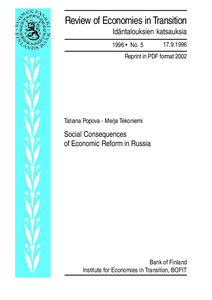Social consequences of economic reform in Russia
Popova, Tatiana; Tekoniemi, Merja (17.09.1996)
Numero
5/1996Julkaisija
Suomen PankkiBank of Finland
1996
Julkaisun pysyvä osoite on
https://urn.fi/URN:NBN:fi:bof-201408113138Tiivistelmä
he ungoing economic reform in Russia has in many respects proceeded without taking into consideration the social questions, which, however, are an essential part of the transformation from socialist planning to a market economy.In order to not to exceed the limit, which the most suffering part of the population can bear, it is vital to migitate the negative social consequences of the reform within the budget constraint.In our view it is possible to find a compromise between social and economic problems through priorising the most acute social problems and the most vulnerable groups of people as well as optimising forms and methods of economic reform in order to minimize its social consequences. The study is organised as follows: the chapter one stresses the actuality of questions related to social sector.The chapter two concentrates on statistical problems in analyzing the situation in the Russian social sector.The main social problems - poverty, unemployment, the situation in medicine, culture, science and education as well as the military, political and criminal insecurity - are analyzed in chapter three.The development of the situation in mentioned social spheres has been analyzed mainly in the period of 1992 - 1996 with the emphasis on the years 1995-1996. The chapter four consists of two parts.The first one gives a picture of the regional differences of social problems, which in Russia are large.The other part of the chapter is devoted to classification of Russians into groups according to their incomes and naming the most acute social problems for these groups.As a conclusion a table of the objective and subjective reasons for the critical situation in Russian social sector is presented. Keywords: social sector, poverty, unemployment, medicine, culture, science, education, criminality, Russia
Julkaisuhuomautus
Uudelleenjulkaistu pdf-muodossa 2002 (Idäntalouksien yksikön sarja)Reprint in PDF format 2002 (Unit for Eastern European Economies series)
